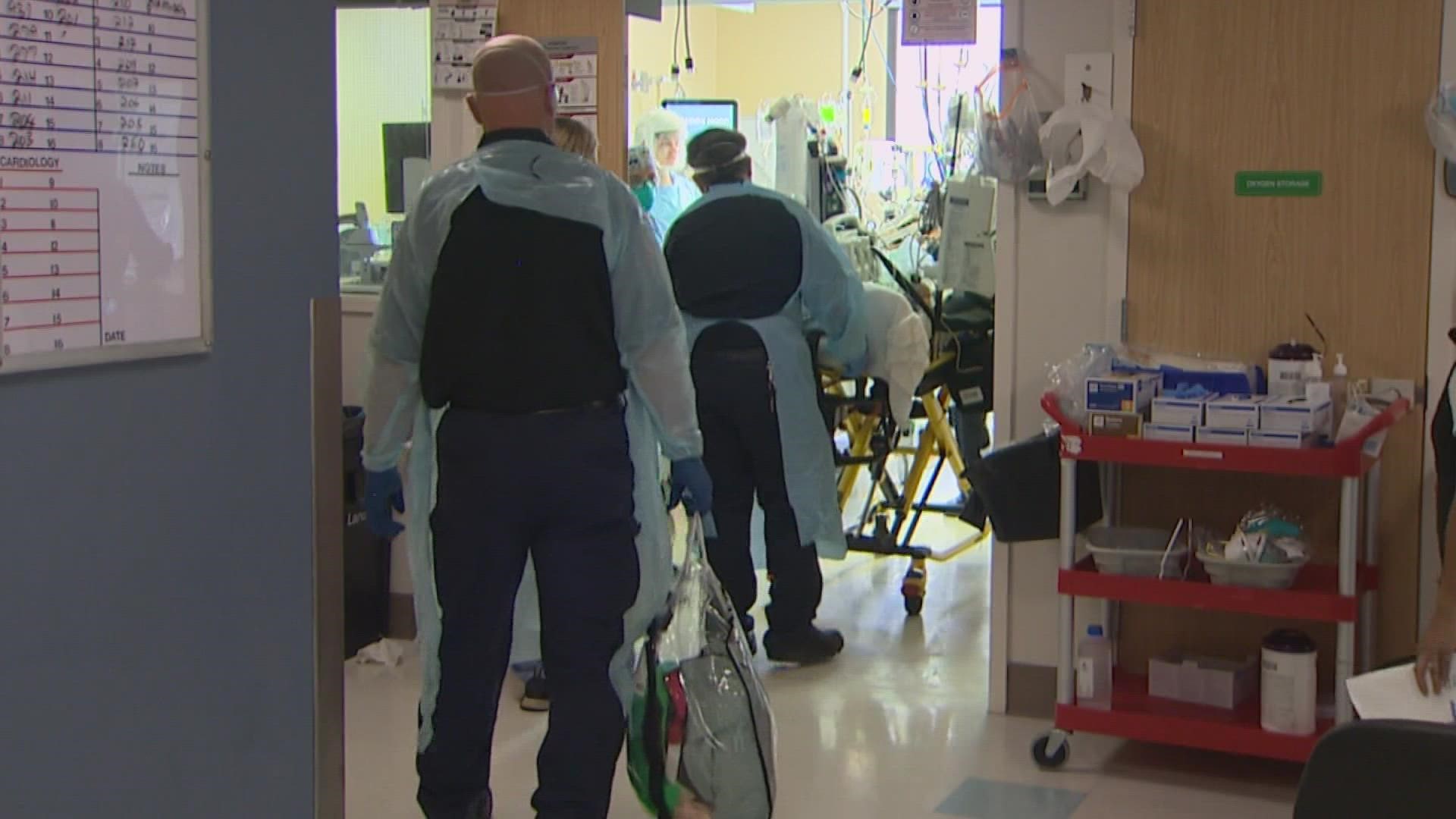SEATTLE — State health leaders provided a grave update Wednesday during a Washington Department of Health (DOH) press briefing, revealing how the state’s health care system is edging closer to a breaking point than it ever has before.
Secretary of Health Dr. Umair Shah was joined by Deputy Secretary Dr. Michele Roberts, Acting Chief Science Officer Dr. Scott Lindquist and Harborview Medical Center Emergency Department Director Dr. Steve Mitchell, who illustrated the current situation for hospitals around the state.
Mitchell said Washington hospitals are at the highest level of occupancy the state has ever seen with 1,463 COVID-19 patients currently hospitalized.
A total of 1,100 of those cases have come in just 30 days, which is equivalent to the capacity of two Harborview Medical Centers.
From Feb. 1 to Aug. 3, 94.5% of COVID-19 cases in the hospital were from unvaccinated patients.
Mitchell said that the effects from the lack of staff and beds are reaching every part of the health care system as facilities continue to ask nurses, physicians and other workers to stretch and pull long hours.
He explained that as patients continue to bottleneck in the emergency room, more patients are waiting longer, transfer patients are being delayed, and ambulances are having to wait longer to offload patients. These are ambulances, Mitchell said, that are then unable to serve the public.
Some of these patients being forced to wait for space, especially those that require critical care, have died before space became available.
One woman whose prognosis was “dire” in eastern Washington recently suffered this fate.
“Our team at the Washington Medical Coordination Center tried for over eight hours to find an ICU bed for this lady, this patient who was severely ill. Unfortunately, she did pass away at this small hospital when after eight hours of trying we were unable to find an ICU bed that could help sustain her life at that point,” he said.
Lindquist showed hospitalizations do not appear to be slowing, either.
“Our case counts are as high as they’ve ever been in the state of Washington,” Lindquist said, the data covering all age groups and demographics.
He was also able to confirm that he learned Tuesday of a child who died from COVID-19 at Seattle Children’s hospital.
While some incomplete data shows a flattening in the rise of new cases and the death rate from COVID-19 remains stable, hospitalizations are not slowing down with the delta variant now making up 96% of cases.
Lindquist also said that while it doesn’t appear cause more severe illness, it is much more infectious than other variants of the virus.
“In just a couple months, the delta variant has ravaged our state,” Shah said, continuing to urge everyone who is eligible to get vaccinated and take preventable measures to slow the spread.
Vaccination rates have increased in the state by about 21% in the last week and 34% in the last two weeks, but it is still not enough to end the pandemic, according to Shah.
“Anything we can do to increase vaccinations, whether that means requirements or incentives, are key to protecting our communities, and now, as you can see, our health care system and ultimately Washingtonians,” Shah said.
As of Sunday, 72.4% of Washington’s eligible population has at least initiated their vaccination, but with the school year starting, the focus now includes children ineligible for vaccines.
Deputy Secretary for DOH COVID-19 Response Dr. Lacy Fehrenbach urged parents to limit risks for their children and choose activities with the least amount of exposure along with mask-wearing around others.
“We face a more transmissible variant, but we have more tools in our toolbox than we did last year,” Fehrenbach said, urging those feeling stressed about the new surge to call Washington Listens for help at 833-681-0211.
“The most important messages right now are wear your masks and get vaccinated,” Shah said. “We have done this before, and now I’m asking you, I’m urging you to reach deep inside and do it again. Our collective health depends on it.”
Shah and the other speakers said that the state's health care system is looking for every alternative to crisis standards of care, which forces hospitals to choose which patients get care and which patients are turned away.

